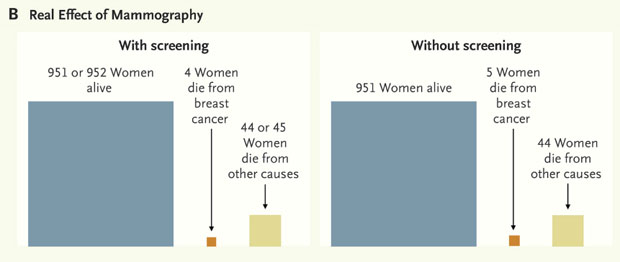Aaron Carroll passes along the following stunning chart about the actual efficacy of routine breast cancer screening on 50-year-old women:

Obviously, there are circumstances where routine screening is a good idea—perhaps if you have a family history of breast cancer or other specific risk factors. But the best recent evidence suggests that routine screening for all women has a negligible effect. At best, it’s very slightly positive. At worst it’s literally zero because false positives lead to interventions that themselves carry a risk of death.
The problem is that people don’t believe this. They think that routine screening has a far greater impact than it really does. The perception of 50-year-old women is that routine screening saves the lives of about 80 women out of a thousand:
Therein lies the problem. If you think that breast cancer is going to kill 16% of all 50-year-old women in the next 10 years and that mammography makes a huge difference in the mortality rate, then you’re going to demand a universal screening program. Hell, I’d demand it if that were the case. Until we can change the perception of the public to more closely match reality, and make them realize that the harms may outweigh the benefits, we’re going to get nowhere in trying to make changes.
We’re all complicit in the level of overdiagnosis in American health care. Over the past few weeks, I’ve probably gotten something like $20,000 worth of tests and other care—with more to come—in an effort to try and figure out why my breathing suddenly went south. I didn’t push back on any of it, and the reason is obvious: when a doctor tells you that your problem might be an embolism or a bad heart or interstitial lung damage, then you damn well want to find out if it is. (It’s not. We still don’t know what’s going on.)
Obviously an acute problem like mine is not the same as routine testing. But I do that too. I’ve resisted the routine colonoscopy so far because my risk profile is low, but I do get a biannual echocardiogram. Why? Because I have high blood pressure, high cholesterol, and a family history of cardio problems. Routine heart monitoring makes sense in my case.
Routine mammographies make sense too—for some women. But for all of them? The best evidence says it doesn’t.


















